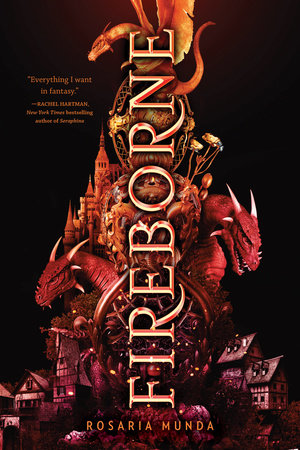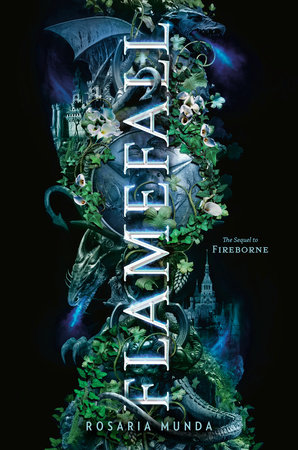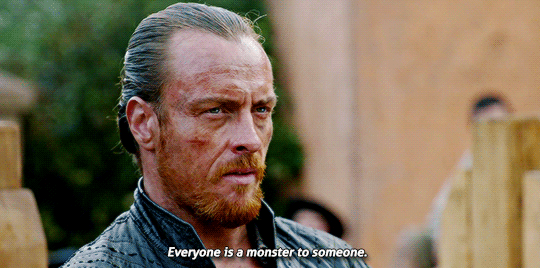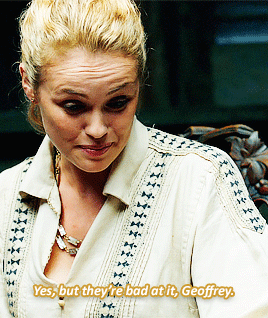There’s this moment in Flamefall, the second book in Rosaria Munda’s Aurelian trilogy, where the protagonist asks one of the leaders of a scrappy band of rebel freedom fighters what they’re fighting for. She’s like “Equality!” and he’s like, “Neat, cool, great, but like what are your policy proposals?” How many dystopian YA novels have you read where the scrappy rebels our protagonist is allied with just have the basic policy “we won’t throw you in a fiery hellpit filled with ravenous snakes like these current bastards”? Like, that is a great start and I’m all for toppling your dystopian nightmare government! It’s just, you do need to have some plan for a governing structure beyond “not throwing dissidents into a hellpit,” which is frankly more of a rallying cry than a policy structure.
Actually even more maddening to me than a lack of policy (eh, maybe not; maybe it’s a toss-up, I find both of these things frustrating) is the suggestion that you can foment and enact revolution without getting your hands dirty. The protagonists of these books sometimes have people around them who are too ruthless and maybe do a bombing, which is a good way to remind the reader that our heroes are moral people who would never harm women or children in their quest to overthrow the corrupt ruling state that throws people into a snake fire hellpit. And then the ultimate message is if you are sufficiently pure of heart, you can totally make an omelet without breaking a few eggs. Hooray! Liberty and justice for all! This is no good for me because my aesthetic is much more:
(Not that anyone has inquired, but if EYE were goingto run a resistance organization, what I’d do is create two separate groups that would appear to be in opposition to each other but secretly they’d be working in concert, and one of the groups would be the nonviolent resistance guys with very clearly articulated policy proposals and a squeaky clean religious leader at its head and the other group would espouse the rhetoric of burning everything down, which they would back up by burning down high-profile targets sometimes, so the ruling class would be very afraid that if they didn’t implement the nonviolent guys’ policy proposals, they’d instead get burned down by the violent guys, so they’d be like, well we won’t talk to you violent jerks, but we’ll talk to these other guys who share some of your less radical goals and seem like they wouldn’t burn down a school, and that’s how I would get my own way in the end, if I were in charge of The Resistance. Which I wouldn’t be. Someone charismatic can be in charge, and I will be the shadowy advisor who comes up with practical ways to achieve their lofty idealistic goals.)
What’s that? Talk about the books, you say? Great, yes, let’s hop to it.

The premise of Fireborne is that the former governing body of Callipolis was these absolute tyrants who maintained their wicked rule through violent dragon enforcement, because they had psychic connections to these scary fire-breathing dragons. Then a man named Atreus came along and did a rebellion to institute a more equitable system, whereby everyone would get placed in a social stratum based on the results of a standardized test. Under this new system, even peasant orphans can be telepathic dragon cops. Hoo–ray? Our two protagonists, Lee and Annie, grew up in an orphanage together and are now two of the lead candidates competing to be Firstriders in the dragon corps. But Lee has a secret: He’s the scion of the old dragonlords, who watched his whole family die in Atreus’s coup d’etat all those years ago. Because you cannot actually make an goddamn omelet without breaking a few goddamn eggs.
What I like about this, as a premise, is that the old regime was very wicked, and at one and the same time, Lee is rightly ambivalent about the new regime. Is it better than the rule of the dragonlords? For sure. Does Lee have serious and lasting trauma from watching his whole family get slaughtered by the rebels who now govern his country? Hundo p. On the other side of things, we have Annie, short for Antigone (love it), who watched her own family die at the hands of Lee’s very father and his dragon. The old regime was very very bad!! It oppressed the peasantry!
But does Rosaria Munda stop upping the ante? SHE DOES NOT. There’s a point in Fireborne where a famine strikes the country and they have to institute rationing, enforced by *jazz hands* dragon riders! Which means: Annie! Which means she has to go into the selfsame peasant countryside areas where she herself was a child and sit upon the same exact type of scary dragon that terrorized her as a child, and she has to use her dragon to intimidate the populace into doing rationing correctly. Moral dilemma!
So then does Rosaria Munda cease upping the ante? My friends, she does not, because under no circumstances can you make a motherfucking omelet without killing a few people.

In Flamefall, the the survivors of the massacre of the dragonlords have taken over governance of a whole other place (New Pythos), where they are now being real jerks to the peasantry there. Griff is a dragonrider, but his dragon wears a muzzle, and he serves at the whim of dragonlords who might at any moment kill his family. That situation: p. bad. Back in the home country, the famine is ongoing, and people with lower medal rankings are receiving smaller rations than people with higher medal rankings (which includes Our Heroes). Meanwhile the regime is tightening its control over the press and even the theaters, and there aren’t enough bunkers for everyone in the event of dragon attack. That situation: p. bad, also.
Oh, and then there are some rebels in the home country, who are fighting for the vague equality I mentioned at the start of this post. Whilst their primary goal (equality) is laudable, they do other things that lead to mass civilian casualties and MORE FAMINE. That situation: this will astonish you, but p. bad too. Just as many governments are bad at governing, many freedom fighters are quite poor at fighting for freedom.
The shouting is cheerful, the [rebels] eager to set out into the night to leave gifts of bread on the steps of the unsuspecting poor…. But the problems with the scene niggle the back of my mind: The bread is made from stolen grain; the luck of those who will receive it stems from their streets being within a walk of the Misanthrope, from living in the neighborhood of someone who dared rob a city granary. The metals stratification isn’t fair, but neither is this haphazard redistribution–
Lee and Annie remain idealists in this book, as they were in the previous one, but they discover very clearly that high ideals are not a trustworthy protection against benefiting from unequal systems. Our new protagonist in Flamefall, Griff, knows this lesson keenly. The life that Atreus saved (?) Callipolis’s peasantry from, Griff is now living. He and his people have been subjugated by the exiled dragonlords and forced into service. Though Griff has a (muzzled) dragon, he lives in service of capricious masters who have abused and terrorized him. You get the sense that Atreus must once have felt the way Griff does now: angry and tired, and desperate to find any way to free his loved ones from the dragonlords’ yoke.
I wouldn’t exactly describe Flamefall as having twists, because like the stories of classical antiquity that it draws on, there’s a certain stony inevitability to everything that happens. Of course Atreus and his allies overthrew the dragonlords; of course Lee misses the family he loved; of course the starving and oppressed people of Callipolis rebel; of course, of course. And just as inevitably, a human cost attends any one of the raft of available bad choices. Still, Lee and Annie (and Griff, now) keep striving to find justice in a world hobbled by the systems put in place by the last bunch of omelet-makers, idealists and pragmatists and tyrants alike.
It feels funny to use the word reassuring about a series that deals with issues as dark as those discussed in the Aurelian series. Still, I did find it reassuring. It reassured me in the sense that there really aren’t easy answers to the question “How can we fix the world?” There are always compromises. There are always failures. People always get hurt. You have to know that, and you have to pick a side anyway.
Also, I screamed at the last chapter of this book. How can I possibly wait one whole year for the third one? I MUST KNOW WHAT HAPPENS NEXT.

